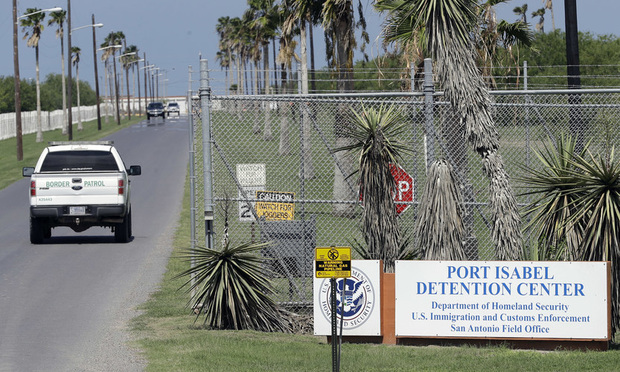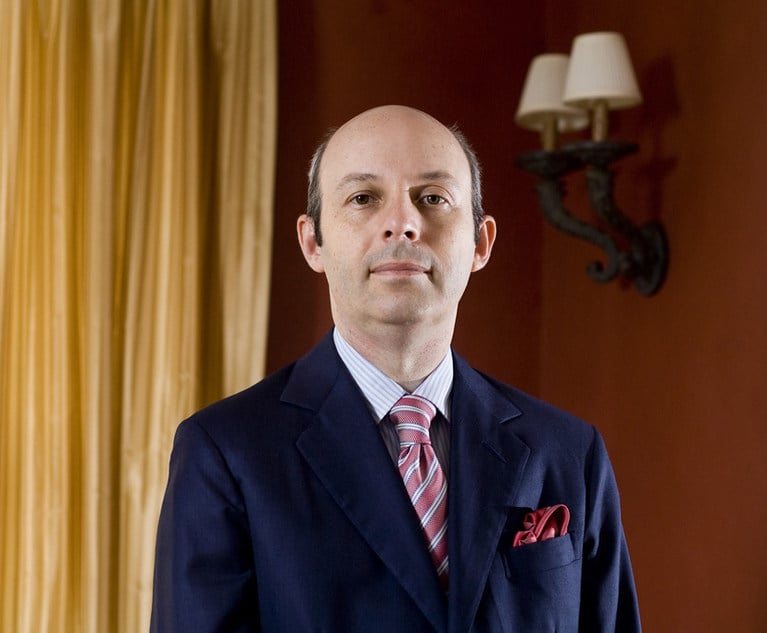Texas Immigration Law Professors Take Action to Help Reunite Families Seeking Asylum
Summer didn't stop Texas immigration law professors from taking action, and in the coming school year, they're planning opportunities for law students in their schools' immigration clinics to help reunited families seek asylum or fight deportation.
August 31, 2018 at 06:00 AM
7 minute read
 A U.S. Border Patrol truck enters the Port Isabel Detention Center, which holds detainees of the U.S. Immigration and Customs Enforcement, Tuesday, June 26, 2018, in Los Fresnos, Texas.
A U.S. Border Patrol truck enters the Port Isabel Detention Center, which holds detainees of the U.S. Immigration and Customs Enforcement, Tuesday, June 26, 2018, in Los Fresnos, Texas.
Law students were on summer break when outrage erupted nationwide over the Trump administration's practice of separating immigrant parents and children who crossed the country's southern border.
But summer didn't stop Texas immigration law professors from taking action, and in the coming school year, they're planning opportunities for law students in their schools' immigration clinics to help reunited families seek asylum or fight deportation.
Law professors all over Texas jumped into action at various levels to help immigrant families the government separated.
On the meta level, Denise Gilman, professor and director of the immigration law clinic at the University of Texas School of Law, helped co-author an emergency request to the Inter-American Commission on Human Rights. The request pleaded with the commission to “stop a human rights and humanitarian crisis perpetrated by the United States government in the Texas-Mexico border.”
The five immigrants who filed the emergency request had been separated from their children, who ranged in age from 7 to 16. The government didn't tell the parents or their lawyers where it took the children, whether they were well, what conditions they were detained in and if or when the government would reunite the children and parents.
U.S. Attorney General Jeff Sessions announced a “zero tolerance” policy on April 6 in which the government would criminally prosecute everyone who crossed the border illegally for misdemeanor entry violations, and if the person had a child, the government would separate them. The government had no way for the kids and parents to communicate. It didn't even know where the kids were being held, let alone how they would be reunited. Some parents were even deported while their children were left behind. Others were criminally convicted and then transferred to immigration detention, where they began proceedings to seek asylum, yet remained separated from their children.
Gilman wrote in an email that the commission communicated with the U.S. government about the family separation policy, but the commission hasn't yet issued a decision on the request. The clinic and other organizations have asked the commission for a hearing in October.
In addition to the emergency request, Gilman said that her immigration clinic assisted the ACLU in obtaining declarations for a lawsuit that led to a federal judge ordering the government to reunite families in July. Gilman said that when students return from summer break, she hopes the separated families will be reunited.
Staff at some law schools have worked directly on the front lines of the family separation crisis.
Aimee Maldonado, a staff attorney in the immigration clinic at South Texas College of Law Houston, was chosen as a volunteer by the Center for Human Rights and Constitutional Law to help reunite families and interview 1,000 children who were detained at Casa Padre in Brownsville. As part of her volunteer work, Maldonado agreed not to speak with the media about the experience, but she did forward an email about the volunteer opportunity.
“You can document who and where these children are, who their parents are, and as much as the children can recall of where and when they were separated from their parents so that we can provide that information to the court and seek their prompt reunification with their families,” the email said.
Another law professor helped two families on the tail end—by reuniting parents with their children.
St. Mary's University School of Law professor Erica Schommer represented two mothers who had been released on bond from the Port Isabel Detention Center, and needed help reconnecting with their children, who were held in San Antonio facilities.
“It was emotional,” Schommer recalled. “I was sick with worry, trying to figure out how it was going to happen and why it wasn't happening the way it should.”
Schommer got so upset because she said she was getting misinformation and observing miscommunication between various government agencies involved in the process. Meanwhile, her clients were suffering, and once the children finally got out, they weren't the same kids.
“One of the kids initially didn't want to see his mom because he was mad. That's an understandable reaction, because they are children: they can't understand why it would take so long for mom to come,” she said.
By late August and early September, when the new law school year is up and running, these professors hope that most immigrant children are back in their parents' arms. But that doesn't mean their legal struggles will end, and law schools are ramping up to take it from there.
South Texas partnered with the Houston Immigration Legal Services Collaborative on its new Deportation Defense Houston project, which promised to prioritize separated families' cases. The law school's contribution is a new Advanced Immigration Clinic launching this fall, and it's already gotten requests to represent separated families, said Vinh Ho, professor and director of Immigration Initiatives at South Texas College of Law Houston.
“I am hoping that we get to work on at least full representation for a dozen or so cases by the end of the year,” Ho said.
Along with the clinic's immigration staff attorney, up to eight law students in the clinic will interview and screen detained immigrants, he explained. In the interviews they will screen clients for bond eligibility and forms of immigration relief—most likely asylum. They'll also do research, ask questions in immigration court and work on Board of Immigration Appeals cases if any of the clients go to that level.
Asylum cases are very common among separated families who come from Central America, yet those cases are going to get harder because Sessions recently decided in a case, Matter of A.B., that people who experienced gang violence or domestic violence in their home countries will no longer be eligible for asylum in the U.S. because their persecution isn't tied to their connection in a “particular social group.”
That's something that Natalie Nanasi's students at Southern Methodist University Dedman School of Law argued against in a Texas Tribune op-ed in late June. Nanasi wrote in an email that Sessions reversed decades of legal precedent that allowed these survivors to get asylum.
“The decision is legally and factually flawed and will unquestionably lead to the deaths of many women at the hands of their abusive partners. Jeff Sessions will have their blood on his hands,” she said. The decision severely limited but didn't completely eliminate their right to asylum, she added. She and her students will use existing law to fight for their clients.
Both Nanasi and Schommer, who runs St. Mary's Immigration and Human Rights Clinic, said they'd continue taking their students to the Karnes City immigration detention center to help families prepare for “credible fear interviews,” the first step in the asylum process.
Trips to Karnes City are also on the horizon for University of Houston Law Center professor Geoffrey Hoffman and his students, who've been helping immigrants and their children “prep for credible fear interviews, intakes, advising about reviews by immigration judges, and advising about requests for reconsideration.”
Schommer added that she's decided not to accept a full caseload in the coming semester, which will allow her to respond to the needs of family separations.
“We will be involved some way,” she said. “The administration seems pretty clear that as soon as they have the capacity to detain more families, they will.”
Angela Morris is a freelance journalist. Follow her on Twitter at @AMorrisReports.
This content has been archived. It is available through our partners, LexisNexis® and Bloomberg Law.
To view this content, please continue to their sites.
Not a Lexis Subscriber?
Subscribe Now
Not a Bloomberg Law Subscriber?
Subscribe Now
NOT FOR REPRINT
© 2025 ALM Global, LLC, All Rights Reserved. Request academic re-use from www.copyright.com. All other uses, submit a request to [email protected]. For more information visit Asset & Logo Licensing.
You Might Like
View All
Texas-Based Ferguson Braswell Expands in California With 6-Lawyer Team From Orange County Law Firm
2 minute read

Crypto Entrepreneur Claims Justice Department’s Software Crackdown Violates US Constitution
4 minute read
SCOTUSblog Co-Founder Tom Goldstein Misused Law Firm Funds, According to Federal Indictment
2 minute readTrending Stories
Who Got The Work
J. Brugh Lower of Gibbons has entered an appearance for industrial equipment supplier Devco Corporation in a pending trademark infringement lawsuit. The suit, accusing the defendant of selling knock-off Graco products, was filed Dec. 18 in New Jersey District Court by Rivkin Radler on behalf of Graco Inc. and Graco Minnesota. The case, assigned to U.S. District Judge Zahid N. Quraishi, is 3:24-cv-11294, Graco Inc. et al v. Devco Corporation.
Who Got The Work
Rebecca Maller-Stein and Kent A. Yalowitz of Arnold & Porter Kaye Scholer have entered their appearances for Hanaco Venture Capital and its executives, Lior Prosor and David Frankel, in a pending securities lawsuit. The action, filed on Dec. 24 in New York Southern District Court by Zell, Aron & Co. on behalf of Goldeneye Advisors, accuses the defendants of negligently and fraudulently managing the plaintiff's $1 million investment. The case, assigned to U.S. District Judge Vernon S. Broderick, is 1:24-cv-09918, Goldeneye Advisors, LLC v. Hanaco Venture Capital, Ltd. et al.
Who Got The Work
Attorneys from A&O Shearman has stepped in as defense counsel for Toronto-Dominion Bank and other defendants in a pending securities class action. The suit, filed Dec. 11 in New York Southern District Court by Bleichmar Fonti & Auld, accuses the defendants of concealing the bank's 'pervasive' deficiencies in regards to its compliance with the Bank Secrecy Act and the quality of its anti-money laundering controls. The case, assigned to U.S. District Judge Arun Subramanian, is 1:24-cv-09445, Gonzalez v. The Toronto-Dominion Bank et al.
Who Got The Work
Crown Castle International, a Pennsylvania company providing shared communications infrastructure, has turned to Luke D. Wolf of Gordon Rees Scully Mansukhani to fend off a pending breach-of-contract lawsuit. The court action, filed Nov. 25 in Michigan Eastern District Court by Hooper Hathaway PC on behalf of The Town Residences LLC, accuses Crown Castle of failing to transfer approximately $30,000 in utility payments from T-Mobile in breach of a roof-top lease and assignment agreement. The case, assigned to U.S. District Judge Susan K. Declercq, is 2:24-cv-13131, The Town Residences LLC v. T-Mobile US, Inc. et al.
Who Got The Work
Wilfred P. Coronato and Daniel M. Schwartz of McCarter & English have stepped in as defense counsel to Electrolux Home Products Inc. in a pending product liability lawsuit. The court action, filed Nov. 26 in New York Eastern District Court by Poulos Lopiccolo PC and Nagel Rice LLP on behalf of David Stern, alleges that the defendant's refrigerators’ drawers and shelving repeatedly break and fall apart within months after purchase. The case, assigned to U.S. District Judge Joan M. Azrack, is 2:24-cv-08204, Stern v. Electrolux Home Products, Inc.
Featured Firms
Law Offices of Gary Martin Hays & Associates, P.C.
(470) 294-1674
Law Offices of Mark E. Salomone
(857) 444-6468
Smith & Hassler
(713) 739-1250






